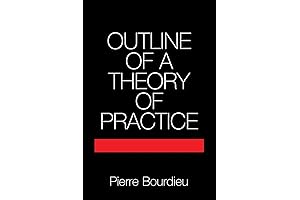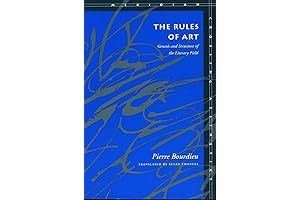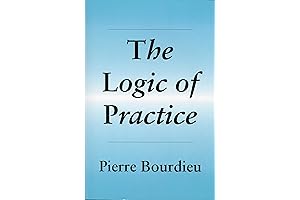· sociology · 12 min read
5 Must-Read Bourdieu Books for Understanding Social Inequality
Explore the best Bourdieu books that provide critical insights into class distinction, power, and culture. Discover essential works to grasp his influential sociology.
French sociologist Pierre Bourdieu's groundbreaking theories on social inequality, power, and culture continue to shape sociological discourse. This list introduces five of his most influential books, essential reading for understanding his work.
Overview

PROS
- Comprehensive analysis of social stratification and cultural taste.
- Original and insightful perspectives on class, status, and power dynamics.
- Seminal text in sociology and cultural theory.
CONS
- Dense and challenging read, requiring close attention.
- Some concepts may be unfamiliar to readers outside of academia.

PROS
- In-depth analysis of the social and economic forces shaping cultural production.
- Introduces the concept of 'cultural capital' and its influence on cultural consumption and production.
CONS
- Dense and complex theoretical framework, which may be challenging for some readers.
- Limited empirical evidence to support some of the claims made.
Pierre Bourdieu's seminal work, 'The Field of Cultural Production', offers a groundbreaking exploration of the social and economic factors that influence the production and consumption of cultural goods. Bourdieu's concept of 'cultural capital' - the accumulation of knowledge, skills, and cultural tastes - is central to his analysis. He argues that this capital, like economic capital, grants individuals access to certain cultural goods and influences their ability to participate in the field of cultural production.
Bourdieu's analysis delves into the complex interplay between social class, education, and aesthetic preferences. He examines how these factors shape the production of cultural goods, from the selection of artworks for display in museums to the distribution of grants to artists. 'The Field of Cultural Production' offers a nuanced understanding of the power dynamics and social hierarchies within the cultural world, providing valuable insights for scholars and policymakers alike.

PROS
- Comprehensive overview of Bourdieu's key concepts, including habitus, field, and social capital.
- Engaging and accessible writing style that makes complex ideas easy to understand.
CONS
- Some readers may find the book's scope to be limited, as it does not cover all of Bourdieu's work.
- The book's focus on Bourdieu's early work means that it does not cover some of his later developments.
Bourdieu: Outline of a Theory of Practice is a comprehensive overview of the work of Pierre Bourdieu, one of the most influential sociologists of the 20th century. The book covers the key concepts of Bourdieu's work, including habitus, field, and social capital, and provides a clear and accessible introduction to his thought.
The book is written in a clear, engaging style, and makes complex ideas easy to understand. It is an essential read for anyone who wants to understand Bourdieu's work, and is a valuable addition to any library on social theory.

PROS
- Provides a clear and comprehensive overview of Bourdieu's key concepts, making them accessible to a wider audience.
- Presents the theoretical framework in a well-structured and engaging manner, allowing readers to grasp the intricate relationships between concepts.
CONS
- May require prior knowledge of sociological theory for a deeper understanding of some concepts.
- The book's focus on Bourdieu's work may limit the exploration of other sociological perspectives.
Pierre Bourdieu: Key Concepts Deciphered is an invaluable resource for students and scholars seeking to understand the profound ideas of Pierre Bourdieu. The book offers a systematic exploration of Bourdieu's theoretical framework, breaking down complex concepts into manageable chunks. Through lucid explanations and well-chosen examples, the author illuminates Bourdieu's concepts of habitus, field, and symbolic capital, shedding light on their significance in understanding social stratification and power dynamics.
This book not only provides a comprehensive overview of Bourdieu's work but also traces the evolution of his thinking over time. It highlights the influence of his early structuralist perspective and his later engagement with practice theory. By presenting Bourdieu's ideas in a coherent and accessible manner, the book effectively bridges the gap between academic scholarship and practical applications of his work in various fields such as sociology, education, and cultural studies.

PROS
- In-depth analysis of the concept of the literary field.
- Bourdieu's influential theoretical framework on cultural production and consumption.
- Empirical studies and case studies provide concrete examples.
CONS
- Complex and challenging concepts for readers unfamiliar with Bourdieu's work.
- Focus on the literary field may limit its applicability to other artistic domains.
In 'The Rules of Art,' Pierre Bourdieu presents a groundbreaking analysis of the literary field, exploring its social, economic, and symbolic dimensions. Bourdieu argues that the literary field is a structured space where individuals and institutions compete for recognition, legitimacy, and symbolic capital. Drawing on empirical studies and case studies, Bourdieu unveils the mechanisms that govern the production, circulation, and evaluation of literary works, highlighting the influence of social factors and power relations on artistic practices and reputations.
Bourdieu's theoretical framework, known as 'field theory,' has significantly influenced the study of culture and society. 'The Rules of Art' provides a comprehensive exploration of this framework, demonstrating its applicability to understanding the dynamics and hierarchies within the art world. Bourdieu's insightful analysis sheds light on the complex interplay between creativity, cultural values, and social structures, making this work an essential read for anyone interested in the sociology of art, literature, or cultural theory.

PROS
- Provides an insightful examination of the interrelation between language, culture, and social power.
- Introduces Bourdieu's groundbreaking theory of symbolic power, offering a novel perspective on social inequality.
CONS
- Can be challenging for readers unfamiliar with Bourdieu's theoretical framework.
- Lacks explicit guidelines for applying symbolic power analysis to empirical research.
Pierre Bourdieu's 'Language and Symbolic Power' is a seminal work that has profoundly shaped our understanding of the intricate relationship between language, culture, and social power. Bourdieu's theory of symbolic power offers a groundbreaking lens through which we can deconstruct the mechanisms by which language perpetuates and reinforces social inequality.
Bourdieu argues that language is not merely a neutral medium of communication but rather a powerful tool that can be used to construct and maintain social hierarchies. He introduces the concept of 'habitus,' a system of dispositions that shapes individuals' perceptions, practices, and values, which is in turn shaped by their social position. Through language, individuals can express and enact their habitus, reproducing and legitimizing existing power structures.

PROS
- Provides a comprehensive exploration of Bourdieu's pivotal concept, Forms of Capital.
- Offers detailed analysis of the interconnections between cultural, economic, and social capital.
CONS
- Some may find the academic language challenging.
- Requires a foundational knowledge of Bourdieu's work to fully grasp the concepts.
Pierre Bourdieu's 'Forms of Capital' delves into the intricate tapestry of social stratification, offering a groundbreaking framework for understanding how individuals negotiate their position within society. Bourdieu posits that individuals possess not only economic capital but also cultural and social capital, which shape their access to opportunities and life chances.
This volume, capturing Bourdieu's lectures at the Collège de France, elucidates the dynamics of these different forms of capital. Bourdieu masterfully untangles how education, cultural tastes, and social networks contribute to the reproduction of social inequality. By delving into 'Forms of Capital,' readers gain a profound understanding of Bourdieu's influential theory, shedding light on the subtle yet pervasive forces that shape our social world.

PROS
- Explores the significance of disinterestedness from a Bourdieuian perspective
- Analyzes the impact of social and cultural capital on the production of art and culture
- Offers insights into the relationship between power, knowledge, and aesthetics
- Provides a critical examination of the concept of disinterestedness in the context of contemporary society
CONS
- Dense academic writing may be challenging for readers unfamiliar with Bourdieu's work
- Limited focus on specific case studies may hinder generalizability
In “The Interest in Disinterestedness: Lectures at the College de France 1987-1989”, Pierre Bourdieu, a renowned French sociologist, delves into the intricate concept of disinterestedness. Through a series of lectures at the College de France, Bourdieu explores the social and historical conditions that shape our understanding of disinterestedness and its role in various fields, including art, literature, and politics.
.
Bourdieu argues that disinterestedness is not a natural or universal human attribute, but rather a product of specific social and cultural conditions. He examines how social and cultural capital influence the production and reception of art and culture, and how these factors shape our perceptions of what is considered disinterested. By analyzing the relationship between power, knowledge, and aesthetics, Bourdieu challenges the traditional view of disinterestedness as a selfless and objective pursuit.

PROS
- Offers a comprehensive analysis of Bourdieu's influential theory of habitus and field.
- Draws upon a wide range of empirical research to demonstrate the practical application of Bourdieu's ideas.
- Features original contributions from leading scholars, providing diverse perspectives on Bourdieu's work.
CONS
- Some readers may find the concepts presented in the book to be complex and challenging to grasp.
- The book primarily focuses on Bourdieu's earlier works, which may overlook some of his later developments and modifications.
In Pierre Bourdieu's seminal work, 'Habitus and Field,' the author delves into the intricate relationship between social structures and individual agency. Bourdieu introduces the concept of habitus, describing it as a system of durable dispositions acquired through socialization and experience, which shapes an individual's perceptions, actions, and tastes. He further explores the concept of field, which refers to the network of social relations and institutions that both constrain and enable individual behavior.
Bourdieu argues that social structures and fields exert a significant influence on habitus, leading to the production and reproduction of social inequalities. However, he also acknowledges the capacity for individuals to exercise agency within these structures and fields. The book explores how individuals navigate social hierarchies, cultural distinctions, and power dynamics, utilizing their habitus to negotiate and adapt to different situations.

PROS
- In-depth analysis that continues to challenge conventional notions of social structure
- Highly influential in sociology, anthropology, and cultural studies
CONS
- Some concepts can be challenging to grasp for beginners
- Too abstract for those seeking practical applications
In 'The Logic of Practice,' Pierre Bourdieu presents a groundbreaking model of cultural structure and social stratification. Bourdieu's theory of 'habitus' has become a cornerstone of contemporary social theory, influencing fields ranging from sociology and anthropology to literary studies and cultural studies.
Bourdieu argues that social practices are not simply the result of individual choices or rational actors, but rather the product of deeply ingrained cultural dispositions that are shaped by our social position and experiences. Our 'habitus,' in turn, shapes our perceptions, preferences, and actions, perpetuating social inequalities and distinctions.
While Bourdieu's work can be challenging at times, it offers a profound and nuanced understanding of the relationship between culture, social structure, and individual agency. 'The Logic of Practice' remains an essential text for anyone interested in the dynamics of social stratification and the ways in which cultural practices and dispositions shape our lives.
Delve into Bourdieu's foundational concepts like cultural capital, habitus, and field theory through these key works. Gain insights into social stratification, the role of education, and the dynamics of cultural production.
Frequently Asked Questions
What is Bourdieu's theory of cultural capital?
Bourdieu argues that cultural capital, such as education, taste, and cultural knowledge, is a valuable resource that contributes to social inequality.
Explain the concept of 'habitus' in Bourdieu's work.
Habitus refers to the system of dispositions and practices that shape individuals' actions and perceptions based on their social position and experiences.
What is the significance of 'field' in Bourdieu's sociology?
Field refers to a social space where individuals compete for resources and power, and where power structures and social norms operate.
How does Bourdieu connect language and power?
Bourdieu sees language as a tool that both reflects and reinforces social hierarchies, giving power to those who possess linguistic capital.
What are the main themes explored in Bourdieu's 'Distinction'?
'Distinction' examines the role of cultural practices and tastes in creating and maintaining social class distinctions.












